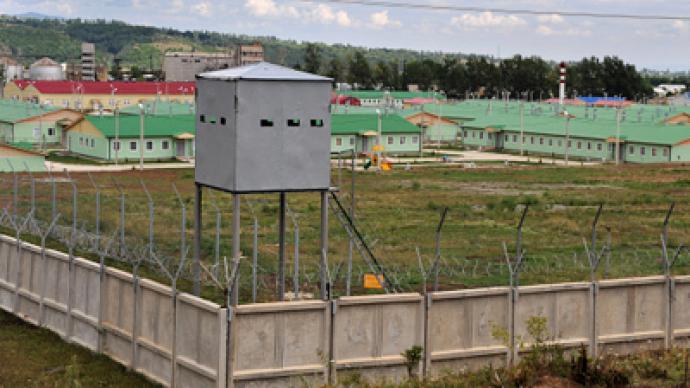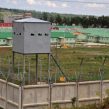
Russia Underscores its Military Presence in Georgia’s Breakaway Regions
Publication: Eurasia Daily Monitor Volume: 10 Issue: 101
By:

On May 14, Russia’s Defense Minister Sergei Shoigu visited Russia’s 7th military base in Gudauta, in the Georgian breakaway region of Abkhazia. At the base, Shoigu toured a Russian military sanatorium and parking lot under construction, which is planned to house current and incoming military hardware (www.regnum.ru, May 15).
Shoigu’s visit at the base underscores Russia’s military occupation of the breakaway Georgian territories of Abkhazia and Tskhinvali region (South Ossetia) and sends a clear and aggressive signal to Georgia and the rest of the world that Russia is here to stay for the foreseeable future, entrenching its military presence in the South Caucasus.
Russia greatly strengthened its military presence in Abkhazia since the 2008 Russian-Georgian war. Moscow allocated $465 million to the development of the military infrastructure in the region. The works included the construction of residential compounds for Russian military personnel, as well as renovations at Bombora, the largest military airfield in the South Caucasus. Moscow also renovated the Ochamchire naval port, strategically located a mere 19 miles from Georgian-controlled territory. The Kremlin has stationed eight patrol boats at the Ochamchire port. Russians also set up radar stations along Abkhazia’s Black Sea coast. With these, Moscow effectively controls not only occupied Abkhazia’s, but also the rest of Georgia’s coastline. Currently Russia keeps about 5,000 military personnel in Abkhazia, 1,500 of which are Federal Security Service (FSB) officers and border guards. However, Russian military infrastructure in Abkhazia can sustain about 10,000 troops (www.civil.ge, May 15).
By entrenching its military presence in Abkhazia, Russia created a strategically important bridgehead against the rest of Georgia. In case of a military campaign against Tbilisi, Moscow possesses ready infrastructure to house and mobilize a formidable military force on Georgian territory against Georgia. Russian military infrastructure also can be used to support Moscow’s military campaign against the armed insurgency in the North Caucasus.
Russian military presence in Abkhazia also has demographic significance. Housing thousands of Russian military personnel in Abkhazia, from where an estimated 270,000 Georgians (about 50 percent of the region’s population) were ethnically cleansed during the 1992–1993 war, is changing the demographic situation in favor of Russia and, in fact, it amounts to a demographic colonization of this Georgian region.
The situation is comparable in Russian-occupied South Ossetia. In November 2012, Russia declared that it would build a military town for 400 Russian military personnel in this breakaway territory (www.regnum.ru, November 21, 2012; see EDM, December 12, 2012). Russia has already stationed thousands of troops in South Ossetia. Russia’s 4th military base in South Ossetia has two branches—one in Tskhinvali district and another one in Java district. These troops, along with troops stationed in Akhalgori district (which do not belong to 4th military base) include about 3,500 military personnel. In fact, Russian troops, stationed in South Ossetia, stand in striking distance—25 miles away—from the Georgian capital of Tbilisi. In case of a military conflict with Georgia, Russian troops could reach the Georgian capital within 30 minutes. Moreover, Russian occupation forces from Tskhinvali could easily, within a matter of one hour, capture the vital East-West Highway and, thus, split Georgia into two parts. Finally, Russia’s 4th military base possesses “Tochka” short-range tactical ballistic missile complexes and “Smerch” heavy multiple rocket launchers—both of which could deliver a devastating blow to virtually any geographic point on the territory of Georgia (www.armada.ge, February 17, 2012).
South Ossetia’s so-called minister of defense is Russian Lieutenant General Valery Yakhnovets. The armed forces of South Ossetia are, in fact, little more than a rag-tag militia. Their fighting capacity is close to zero. By Lieutenant General Yakhnovets’ own words, without Russia’s help, South Ossetian forces would not stand a chance against the Georgian Armed Forces. The breakaway territory’s armed forces depend on Russia for weapons, ammunition and military infrastructure. According to Yakhnovets, for the last 20 years not a single military facility has been built in South Ossetia (www.pirweli.com.ge, February 24).
Although, 3,500 Russian troops are not enough to mount a full-scale military offensive against Georgia, Russian military presence in South Ossetia provides another convenient bridgehead to mobilize thousands of Russian troops directly from Russia in a fairly short amount of time via the Roki Tunnel, which connects South Ossetia with the Russian Federation. The tunnel is now under Moscow’s complete control.
Russia’s military presence in Abkhazia and the Tskhinvali region represents the most dangerous threat to Georgia’s territorial integrity, independence and statehood. Though Moscow on a regular basis claims to be the guarantor of peace and stability in the South Caucasus, its military presence, in fact, remains the single biggest challenge to peace and stability not only in Georgia, but in the entire South Caucasus region.
Russia will do everything in its capacity to maintain a powerful military presence in Georgia. Moreover, it is highly likely that should Georgia decide to upgrade its own military capabilities, Russia will extend its military infrastructure and presence in the occupied regions and may even answer Georgia with military provocations. It is certain that Russian military bases will continue to hang as a Sword of Damocles over Georgia for the foreseeable future. But it is highly unlikely that Tbilisi will manage to achieve the removal of Russian occupying forces from its territories on its own, without the help of Western countries. As long as the West talks softly to President Vladimir Putin’s regime, Russia will remain the dominant military power in the South Caucasus. Conversely, however, as long as Russia remains militarily entrenched in the region, the resolution of the Abkhazian and South Ossetian conflicts will remain elusive.




